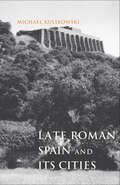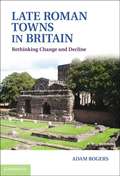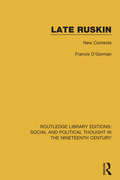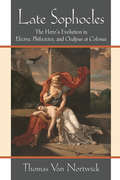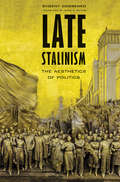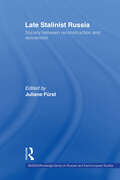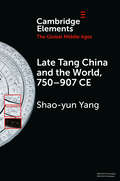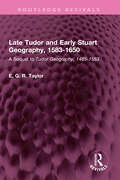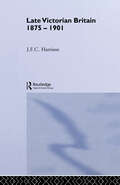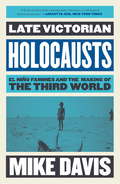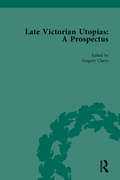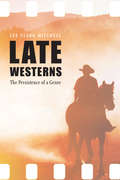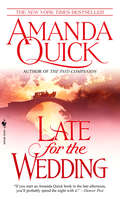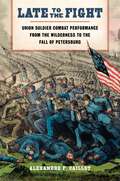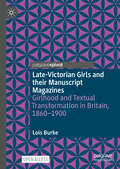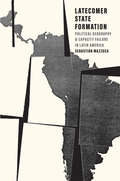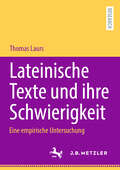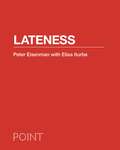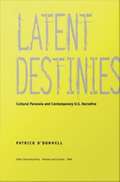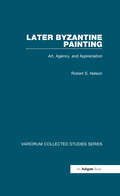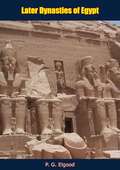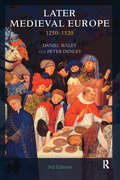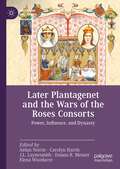- Table View
- List View
Late Roman Spain and Its Cities (Ancient Society and History)
by Michael KulikowskiThis groundbreaking history of Spain in late antiquity sheds new light on the fall of the western Roman empire and the emergence of medieval Europe.Historian Michael Kulikowski draws on the most recent archeological and literary evidence in this fresh an enlightening account of the Iberian Peninsula from A.D. 300 to 600. In so doing, he provides a definitive narrative that integrates late antique Spain into the broader history of the Roman empire. Kulikowski begins with a concise introduction to the early history of Roman Spain, and then turns to the Diocletianic reforms of 293 and their long-term implications for Roman administration and the political ambitions of post-Roman contenders. He goes on to examine the settlement of barbarian peoples in Spain, the end of Roman rule, and the imposition of Gothic power in the fifth and sixth centuries. In parallel to this narrative account, Kulikowski offers a wide-ranging thematic history, focusing on political power, Christianity, and urbanism.Kulikowski’s portrait of late Roman Spain offers some surprising conclusions, finding that the physical and social world of the Roman city continued well into the sixth century despite the decline of Roman power. Winner of an Honorable Mention in the Association of American Publishers’ Professional and Scholarly Publishing Awards in Classics and Archeology
Late Roman Towns in Britain
by Adam RogersIn this book, Adam Rogers examines the late Roman phases of towns in Britain. Critically analysing the archaeological notion of decline, he focuses on public buildings, which played an important role, administrative and symbolic, within urban complexes. Arguing against the interpretation that many of these monumental civic buildings were in decline or abandoned in the later Roman period, he demonstrates that they remained purposeful spaces and important centres of urban life. Through a detailed assessment of the archaeology of late Roman towns, this book argues that the archaeological framework of decline does not permit an adequate and comprehensive understanding of the towns during this period. Moving beyond the idea of decline, this book emphasises a longer-term perspective for understanding the importance of towns in the later Roman period.
Late Ruskin: New Contexts (Routledge Library Editions: Social and Political Thought in the Nineteenth Century #6)
by Francis O'GormanReaders of Victorian non-fictional prose were encouraged to believe that John Ruskin had died in 1860. Not literally, but intellectually and imaginatively. This study of his later life and work, first published in 2001, aims to refresh, revise and overturn certain perceptions about the writer that many readers still hold. This title will be of interest to students of history.
Late Sophocles: The Hero’s Evolution in Electra, Philoctetes, and Oedipus at Colonus
by Thomas Van NortwickOnly a few plays by Sophocles--one of the great tragic playwrights from Classical Athens--have survived, and each of them dramatizes events from the rich store of myths that framed literature and art. Sophocles' treatment evokes issues that were vividly contemporary for Athenian audiences of the Periclean age: How could the Athenians incorporate older, aristocratic ideas about human excellence into their new democratic society? Could citizens learn to be morally excellent, or were these qualities only inherited? What did it mean to be a creature who knows that he or she must die? Late Sophocles traces the evolution of the Sophoclean hero through the final three plays, Electra, Philoctetes, and Oedipus at Colonus. The book's main thesis, that Sophocles reimagined the nature of the tragic hero in his last three works, is developed inductively through readings of the plays. This balanced approach, in which a detailed argument about the plays is offered in a format accessible to nonspecialists, is unusual--perhaps unique--in contemporary Classical scholarship on Sophocles. This book will appeal to nonspecialist readers of serious literature as well as scholars of classical and other literatures. While including ample guidance for those not familiar with the plays, Late Sophocles goes beyond a generalized description of "what happens" in the plays to offer a clear, jargon-free argument for the enduring importance of Sophocles' plays. The argument's implications for longstanding interpretational issues will be of interest to specialists. All Greek is translated.
Late Soviet Culture from Perestroika to Novostroika
by Thomas Lahusen Gene KupermanAs the Soviet Union dissolved, so did the visions of past and future that informed Soviet culture. With Dystopia left behind and Utopia forsaken, where do the writers, artists, and critics who once inhabited them stand? In an "advancing present," answers editor Thomas Lahusen. Just what that present might be--in literature and film, criticism and theory, philosophy and psychoanalysis, and in the politics that somehow speaks to all of these--is the subject of this collection of essays.Leading scholars from the former Soviet Union and the West gather here to consider the fate of the people and institutions that constituted Soviet culture. Whether the speculative glance goes back (to czarist Russia or Soviet Freudianism, to the history of aesthetics or the sociology of cinema in the 1930s) or forward (to the "market Stalinism" one writer predicts or the "open text of history" another advocates), a sense of immediacy, or history-in-the-making animates this volume. Will social and cultural institutions now develop organically, the authors ask, or is the society faced with the prospect of even more radical reforms? Does the present rupture mark the real moment of Russia's encounter with modernity? The options explored by literary historians, film scholars, novelists, and political scientists make this book a heady tour of cultural possibilities. An expanded version of a special issue of South Atlantic Quarterly (Spring 1991), with seven new essays, Late Soviet Culture will stimulate scholar and general reader alike.Contributors. Katerina Clark, Paul Debreczeny, Evgeny Dobrenko, Mikhail Epstein, Renata Galtseva, Helena Goscilo, Michael Holquist, Boris Kagarlitsky, Mikhail Kuraev, Thomas Lahusen, Valery Leibin, Sidney Monas, Valery Podoroga, Donald Raleigh, Irina Rodnyanskaya, Maya Turovskaya
Late Stalinism: The Aesthetics of Politics
by Evgeny DobrenkoHow the last years of Stalin&’s rule led to the formation ofan imperial Soviet consciousness In this nuanced historical analysis of late Stalinism organized chronologically around the main events of the period—beginning with Victory in May 1945 and concluding with the death of Stalin in March 1953—Evgeny Dobrenko analyzes key cultural texts to trace the emergence of an imperial Soviet consciousness that, he argues, still defines the political and cultural profile of modern Russia.
Late Stalinist Russia: Society Between Reconstruction and Reinvention (BASEES/Routledge Series on Russian and East European Studies)
by Juliane FürstThe late Stalinist period, long neglected by researchers more interested in the high-profile events of the 1930s, has recently become the focus of much new research by people keen to understand the enormous impact of the war on Soviet society and to understand Soviet life under 'mature socialism'. Written by top scholars from high profile universities, this impressive work brings together much new, cutting edge research on a wide range of aspects of late Stalinist society. Filling a gap in the literature, it focuses above all on the experience of the Soviet people and their interaction with ideology, state policy and national and international politics.
Late Star Trek: The Final Frontier in the Franchise Era (Mass Markets: Storyworlds Across Media)
by Adam KotskoHow Star Trek&’s twenty-first-century reinventions illuminate the unique challenges and opportunities of franchise-style corporate storytellingLate Star Trek explores the beloved science fiction franchise&’s repeated attempts to reinvent itself after the end of its 1990s golden age. Beginning with the prequel series Enterprise, Adam Kotsko analyzes the wealth of content set within Star Trek&’s sprawling continuity—including authorized books, the three &“Kelvin Timeline&” films, and the streaming series Discovery, Picard, Lower Decks, Prodigy, and Strange New Worlds—along with fan discourse, to reflect on the perils and promise of the franchise as a unique form of storytelling. Significantly including the licensed novels and comic books that fill out the Star Trek universe for its fans, Kotsko brings the multiple productions of the early twenty-first century together as a unified whole rather than analyzing them in their current stratified view. He argues that the variety of styles and approaches in this tumultuous era of Star Trek history provides the perfect opportunity to reflect on the nature of the franchise storyworlds that now dominate popular culture. By taking the spin-offs and tie-ins seriously as creative attempts to tell a new story within an established universe, Late Star Trek highlights creative triumphs as well as the tendency for franchise faithfulness to get in the way of creating engaging characters and ideas. Arguing forcefully against the prevailing consensus that franchises are a sign of cultural decay, Kotsko contends that the Star Trek universe exemplifies an approach to storytelling that has been perennial across cultures. Instead, he finds that what limits creativity within franchises is not their reliance on the familiar but their status as modern myths, held not as common cultural heritage but rather owned as corporate intellectual property. Retail e-book files for this title are screen-reader friendly with images accompanied by short alt text and/or extended descriptions.
Late Tang China and the World, 750–907 CE (Elements in the Global Middle Ages)
by Shao-yun YangIn recent decades, the Tang dynasty (618-907) has acquired a reputation as the most 'cosmopolitan' period in Chinese history. The standard narrative also claims that this cosmopolitan openness faded after the An Lushan Rebellion of 755-763, to be replaced by xenophobic hostility toward all things foreign. This Element reassesses the cosmopolitanism-to-xenophobia narrative and presents a more empirically-grounded and nuanced interpretation of the Tang empire's foreign relations after 755.
Late Tudor and Early Stuart Geography, 1583-1650: A Sequel to Tudor Geography, 1485-1583 (Routledge Revivals)
by E. G. TaylorFirst published in 1934, Late Tudor and Early Stuart Geography is a critical commentary on a chronologically arranged bibliography of nearly two thousand contemporary printed and manuscript works. Poets, preachers and philosophers, mathematicians, physicians and astrologers, sailors, merchants and company-promoters were contributors to the absorbing medley that comprises the geographical literature of the late Tudor and early Stuart period. For this was the fading twilight of that Golden Age of unspecialized learning when all knowledge lay within one man’s compass. This book will be of interest to historians, economists, sociologists and litterateurs.
Late Victorian Britain 1875-1901
by J.F.C. HarrisonDrawing heavily on the recollections and literature of the people themselves, Harrison places late Victorian Britain firmly in its social and political context.
Late Victorian Holocausts
by Mike DavisExamining a series of El Niño-induced droughts and the famines that they spawned round the globe in the last third of the 19th century, Mike Davis discloses the intimate, baleful relationship between imperial arrogance and natural incident that combined to produce some of the worst tragedies in human history.<P> Late Victorian Holocausts focuses on three zones of drought and subsequent famine: India, Northern China, and Northeastern Brazil. All were affected by the same global climatic factors that caused massive crop failures, and all experienced brutal famines that decimated local populations. But the effects of drought were magnified in each case because of singularly destructive policies promulgated by different ruling elites.<P> Davis argues that the seeds of underdevelopment in what later became known as the Third World were sown in this era of High Imperialism, as the price for capitalist modernization was paid in the currency of millions of peasants' lives.
Late Victorian Utopias: A Prospectus, Volume 3
by Gregory ClaeysThis collection of literary utopias calls for a complete overhaul of existing assumptions about utopian writing in this period. The representation of utopian texts in these volumes shows that William Morris is far from "representative" of basic trends in the genre in this era. This is Volume 3 of 6 and looks at selected works from 1886 to 1892.
Late Westerns: The Persistence of a Genre (Postwestern Horizons)
by Lee Clark MitchellFor more than a century the cinematic Western has been America’s most familiar genre, always teetering on the verge of exhaustion and yet regularly revived in new forms. Why does this outmoded vehicle—with the most narrowly based historical setting of any popular genre—maintain its appeal? In Late Westerns Lee Clark Mitchell takes a position against those critics looking to attach “post” to the all-too-familiar genre. For though the frontier disappeared long ago, though men on horseback have become commonplace, and though films of all sorts have always, necessarily, defied generic patterns, the Western continues to enthrall audiences. It does so by engaging narrative expectations stamped on our collective consciousness so firmly as to integrate materials that might not seem obviously “Western” at all. Through plot cues, narrative reminders, and even cinematic frameworks, recent films shape interpretive understanding by triggering a long-standing familiarity audiences have with the genre. Mitchell’s critical analysis reveals how these films engage a thematic and cinematic border-crossing in which their formal innovations and odd plots succeed deconstructively, encouraging by allusion, implication, and citation the evocation of generic meaning from ingredients that otherwise might be interpreted quite differently. Applying genre theory with close cinematic readings, Mitchell posits that the Western has essentially been “post” all along.
Late for the Wedding
by Amanda QuickNew York Times bestselling author Amanda Quick returns with a thrilling new venture into romance and mystery, featuring the most unusual, highly compatible--undeniably combustible--pairing of Tobias March and his mesmerizing partner, Lavinia Lake.An invitation to a country house party at Beaumont Castle provides a perfect solution to Tobias and Lavinia's most exasperating challenge: how to escape the chaos of London for a remote, relaxing--and above all romantic--retreat from prying eyes and wagging tongues. But the lovers' plans are foiled when their first cozy interlude of the weekend is disrupted by the appearance of a stunning woman from Tobias's past. Aspasia Gray's beauty is as haunting as her connection to Tobias. Her long-deceased fiancé was a friend of his--in addition to being an eccentric assassin. The mysterious nature of the bond between Tobias and Aspasia makes Lavinia more than a little uncomfortable. Especially as her first encounter with Aspasia occurs when she finds her in Tobias's bedchamber...It seems Aspasia is seeking protection--and solace--after receiving an ominous message that eerily recalls the past. Suddenly the obstacles standing betweenTobias and Lavinia appear greater than just a little London gossip--and far more deadly.When events at the castle suggest someone is imitating the dead killer's methods, the team of Lake and March fervently pursue the investigation--and each other--as their leads take them from Society's most elegant haunts--and most discreet hideaways--to London's shadiest backstreets. As their relationship heats up, so does the intrigue. Soon Lavinia will have to employ all her talents to flummox the scoundrel who so rudely interrupted her rendezvous. And then she and Tobias can get back to more pleasurable affairs.From the Hardcover edition.
Late to the Fight: Union Soldier Combat Performance from the Wilderness to the Fall of Petersburg (Conflicting Worlds: New Dimensions of the American Civil War)
by Alexandre F. CaillotIn Late to the Fight, Alexandre F. Caillot explores the combat performance of the Union soldiers who filled newly raised regiments that fought through the Civil War’s final year. Historians have typically regarded these late enlistees as substandard to those who signed on at the war’s start. Using the experiences of the 17th Vermont and 31st Maine Volunteer Infantry Regiments to assess the record of late-arriving soldiers under fire, Caillot shows that these forgotten boys in blue left behind a record of valor and sacrifice essential to achieving the destruction of the Confederacy.
Late-Victorian Girls and their Manuscript Magazines: Girlhood and Textual Transformation in Britain, 1860-1900
by Lois BurkeThis open access book presents fresh archival evidence to explore the underexamined manuscript cultures of girls living in Britain in the late nineteenth century. Girls were keen writers during this period, which witnessed Golden Ages of children's literature and journalism, as well as major developments in proto feminism. Girl writers were particularly prolific in the writing of manuscript magazines. These were handmade magazines in which the contributors were also the readers and subscribers. This book presents three case study chapters exploring manuscript magazines which were created and exchanged amongst girl-led writing groups and within families, and references many other examples of manuscript magazine cultures from the late-Victorian period. It argues that strategies of transformative writing—namely appropriating literary texts—often characterized girls' contributions to manuscript magazines.
Latecomer State Formation: Political Geography and Capacity Failure in Latin America
by Sebastian MazzucaA major contribution to the field of comparative state formation and the scholarship on long-term political development of Latin America Latin American governments systematically fail to provide the key public goods for their societies to prosper. Sebastián Mazzuca argues this is because nineteenth-century Latin American state formation occurred in a period when commerce, rather than war, was the key driver forging countries. Latin American leaders pursued the benefits of international trade at the cost of long-term liabilities built into the countries they forged, notably patrimonial administrations and dysfunctional regional combinations.
Lateinische Texte und ihre Schwierigkeit: Eine empirische Untersuchung
by Thomas LaursIn diesem Buch wird ein neuartiger Ansatz zur Vorhersage der Schwierigkeit lateinischer Texte entwickelt, der die sprachliche Analyse mit Methoden des maschinellen Lernens verbindet. Grundlage der Untersuchung sind lateinische Texte unterschiedlicher Schwierigkeitsstufen, deren Lesbarkeit von Studenten subjektiv eingeschätzt worden ist und durch eine Vielzahl sprachlicher Variablen quantitativ erfasst wird. Ein zentrales Ziel der Arbeit ist es, ein Modell zu erstellen, das auf Basis der sprachlichen Variablen und der Einschätzungen der Probanden die Schwierigkeit eines lateinischen Textes bewerten kann. Hierzu wurden sowohl klassische linguistische Methoden als auch moderne NLP-Tools eingesetzt. Untersucht werden sprachliche Parameter aus den Bereichen Lexik und Semantik, Morphologie, Syntax und Diskurslinguistik. Ein besonderes Augenmerk liegt auch auf der Unterscheidung zwischen prosaischen und poetischen Texten. Die Ergebnisse tragen nicht nur zur Schwierigkeitsbestimmung lateinischer Texte bei, sondern eröffnen auch neue Perspektiven für die Didaktik des Lateinischen. Sie zeigen, wie digitale Methoden die Bewertung und Auswahl von Lehrmaterialien erleichtern können und leisten zugleich einen Beitrag zur Verbindung von klassischer Philologie und moderner Datenwissenschaft.
Lateness (POINT: Essays on Architecture #2)
by Peter Eisenman Elisa IturbeA provocative case for historical ambiguity in architecture by one of the field's leading theoristsConceptions of modernity in architecture are often expressed in the idea of the zeitgeist, or "spirit of the age," an attitude toward architectural form that is embedded in a belief in progressive time. Lateness explores how architecture can work against these linear currents in startling and compelling ways. In this incisive book, internationally renowned architect Peter Eisenman, with Elisa Iturbe, proposes a different perspective on form and time in architecture, one that circumvents the temporal constraints on style that require it to be "of the times"—lateness. He focuses on three twentieth-century architects who exhibited the qualities of lateness in their designs: Adolf Loos, Aldo Rossi, and John Hejduk. Drawing on the critical theory of Theodor Adorno and his study of Beethoven's final works, Eisenman shows how the architecture of these canonical figures was temporally out of sync with conventions and expectations, and how lateness can serve as a form of release from the restraints of the moment.Bringing together architecture, music, and philosophy, and drawing on illuminating examples from the Renaissance and Baroque periods, Lateness demonstrates how today's architecture can use the concept of lateness to break free of stylistic limitations, expand architecture's critical capacity, and provide a new mode of analysis.
Latent Destinies: Cultural Paranoia and Contemporary U.S. Narrative
by Patrick O'DonnellLatent Destinies examines the formation of postmodern sensibilities and their relationship to varieties of paranoia that have been seen as widespread in this century. Despite the fact that the Cold War has ended and the threat of nuclear annihilation has been dramatically lessened by most estimates, the paranoia that has characterized the period has not gone away. Indeed, it is as if--as O'Donnell suggests--this paranoia has been internalized, scattered, and reiterated at a multitude of sites: Oklahoma City, Waco, Ruby Ridge, Bosnia, the White House, the United Nations, and numerous other places. O'Donnell argues that paranoia on the broadly cultural level is essentially a narrative process in which history and postmodern identity are negotiated simultaneously. The result is an erasure of historical temporality--the past and future become the all-consuming, self-aware present. To explain and exemplify this, O'Donnell looks at such books and films as Libra, JFK, The Crying of Lot 49, The Truman Show, Reservoir Dogs, Empire of the Senseless, Oswald's Tale, The Executioner's Song, Underworld, The Killer Inside Me, and Groundhog Day. Organized around the topics of nationalism, gender, criminality, and construction of history, Latent Destinies establishes cultural paranoia as consonant with our contradictory need for multiplicity and certainty, for openness and secrecy, and for mobility and historical stability. Demonstrating how imaginative works of novels and films can be used to understand the postmodern historical condition, this book will interest students and scholars of American literature and cultural studies, postmodern theory, and film studies.
Later Byzantine Painting: Art, Agency, and Appreciation (Variorum Collected Studies)
by Robert S. NelsonWritten over nearly three decades, the fifteen essays involve the three a's of the title, art, agency, and appreciation. The first refers to the general subject matter of the book, Byzantine art, chiefly painting, of the twelfth through the fourteenth centuries, the second to its often human-like agency, and the last to its historical reception. Responding to different issues and perspectives that have animated art history and Byzantine studies in recent decades, the essays have wide theoretical range from art historical formalism, iconography, archaeology and its manuscript equivalent codicology, to statistics, patronage, narratology, and the histories of science and collecting. The series begins with art works themselves and with the imagery and iconography of church decoration and manuscript illumination, shifts to the ways that objects act in the world and affect their beholders, and concludes with more general appreciations of Byzantine art in case studies from the thirteenth century to the present.
Later Dynasties of Egypt
by P. G. ElgoodFirst published in 1951, the present volume is a history of Egypt in its declining years. It details the Pharaonic struggle with the priesthoods over power, the intervention of the Ethiopians and the subsequent invasions by the Assyrians, Chaldeans and the Persians culminating in the arrival of Alexander the Great.“IN writing this book, the author desired, as in his previous work Ptolemies of Egypt, to interest the general reader in the ruling personalities in Egypt during a period when the fate of that country was as intertwined with that of its neighbour states as it is in modern days.”—P. G. Elgood
Later Medieval Europe: 1250-1520
by Daniel Waley Peter DenleyFrom the divine right of kings to the political philosophies of writers such as Machiavelli, the medieval city-states to the unification of Spain, Daniel Waley and Peter Denley focus on the growing power of the state to illuminate changing political ideas in Europe between the thirteenth and sixteenth centuries. Spanning the entire continent and beyond, and using contemporary voices wherever possible, the authors include substantial sections on economics, religion, and art, and how developments in these areas fed into and were influenced by the transformation of political thinking. The new edition takes the narrative beyond the confines of western Europe with chapters on East Central Europe and the teutonic knights, and the Portuguese expansion across the Atlantic. The third edition of this classic introduction to the period includes even greater use of contemporary voices, full reading lists, and new chapters on East Central Europe and Portuguese exploration. Suitable as an introductory text for undergraduate courses in Medieval Studies and Medieval European History.
Later Plantagenet and the Wars of the Roses Consorts: Power, Influence, and Dynasty (Queenship and Power)
by Elena Woodacre Carolyn Harris J. L. Laynesmith Aidan Norrie Danna R. MesserThis book examines the lives and tenures of the consorts of the Plantagenet dynasty during the later Middle Ages, encompassing two major conflicts—the Hundred Years’ War and the Wars of the Roses. The figures in this volume include well-known consorts such as the “She Wolves” Isabella of France and Margaret of Anjou, as well as queens who are often overlooked, such as Philippa of Hainault and Joan of Navarre. These innovative and authoritative biographies bring a fresh approach to the consorts of this period—challenging negative perceptions created by complex political circumstances and the narrow expectations of later writers, and demonstrating the breadth of possibilities in later medieval queenship. Their conclusions shed fresh light on both the politics of the day and the wider position of women in this age. This volume and its companions reveal the changing nature of English consortship from the Norman Conquest to today.
